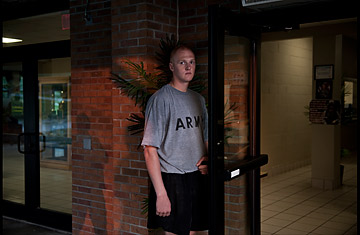
A recruit at Fort Jackson holds open the door to the mess hall during breakfast hours.
(5 of 8)
In his speeches, Gates did not mention a related fact of military life: the force is more conservative than the nation as a whole. A Pew survey of 712 post-9/11 veterans revealed last month that the political leanings of people in uniform are nearly the mirror opposite of the public they serve. The survey found that 36% of veterans describe themselves as Republicans, while 21% say they are Democrats. In the public at large, those numbers are nearly reversed: 34% of the public identifies as Democratic, while 23% identifies as Republican. The curve bends more to the right as rank increases: a 2009 survey by Heidi Urben, an active-duty officer and graduate student at Georgetown University, found that 60% of 4,000 Army officers self-identified as Republicans, whereas only 18% said they were Democrats.
On the one hand, this shift has been under way for years. From 1976 to 1996, the share of senior military officers identifying as Republican jumped from one-third to two-thirds, while the share claiming to be independent fell from 46% to 22%. Senior military officers who described themselves as liberal fell from 16% in 1976 to 3% in 1996. Urben's survey found that younger officers leaving the Army were far more likely to identify themselves as Democrats than those opting to stay. All this takes the nation onto perilous ground, not because the military tilts Republican or Democrat but because it needs to be seen as straight-shooting and nonpartisan. That perception has been fading. When Obama weighed sending reinforcements to Afghanistan in 2009, senior military officials painted him into a corner with leaks--and premature public pronouncements--arguing that significantly more troops than some in the White House favored were needed to get the job done. The maneuver worked: Obama wound up agreeing to send 30,000 troops--but only if they began coming home 18 months later. In order to hold the military to this deal, his aides then leaked details of a behind-the-scenes conversation in which the generals could be heard agreeing to Obama's 18-month timetable. It was not the finest hour for civilian control of the military.
But the generals had the last word. When Obama announced the beginning of the Afghanistan pullout in June, White House aides told reporters that the announced pace of the withdrawal had been among the options presented to the President by his generals. But within the week, the top U.S. commander in Afghanistan testified in public that Obama's pullout schedule "is a more aggressive option than that which was presented" by the military to the White House. When Senator Lindsey Graham asked Marine General John Allen if Obama's final decision was presented in any form by the Pentagon, the four-star general replied, "It was not."
